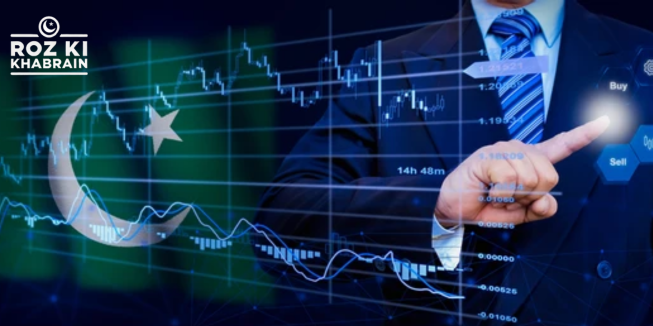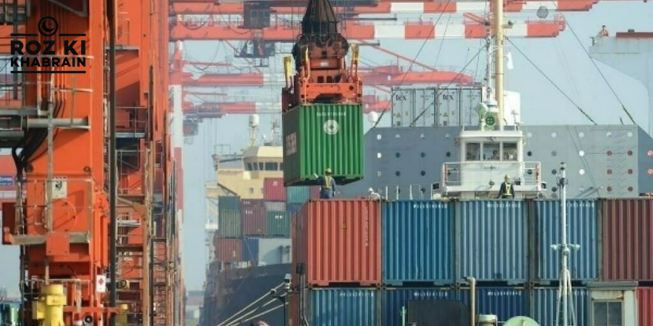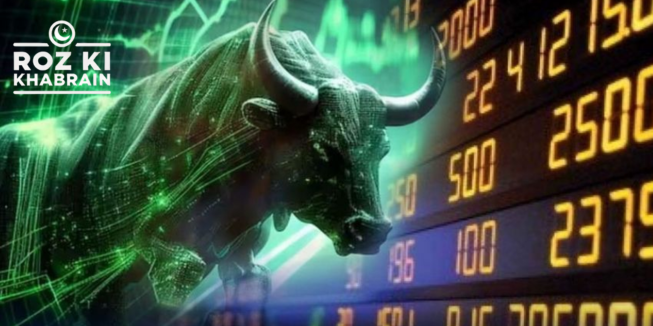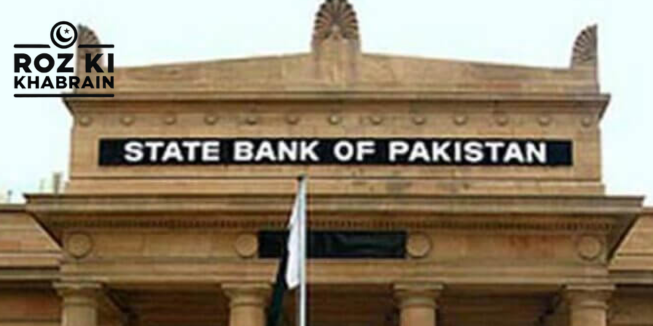Stocks Climb Near 83,000-Point Mark Amid Economic Optimism
Stocks surged on Thursday, approaching the 83,000-point mark as renewed economic optimism sparked a buying spree in high-dividend-yielding shares, with investors anticipating further monetary easing following inflation’s drop to a 44-month low in September.
The Pakistan Stock Exchange’s (PSX) benchmark KSE-100 Index rose by 754.76 points, or 0.92%, to close at 82,958.73.
During intraday trading, the market jumped by 924.94 points, or 1.13%, reaching a peak of 82,958.73 around 2:06 PM. However, a brief period of late selling curtailed some of the earlier gains.
Khurram Schehzad, CEO of Alpha Beta Core, noted that investors are speculating that the State Bank of Pakistan (SBP) may extend its hawkish monetary policy due to the steady decline in inflation.
“There are expectations of a policy rate cut of up to 400 basis points by December, as there is room for easing,” Schehzad stated, suggesting that the SBP’s Monetary Policy Committee (MPC) might lower rates before its next scheduled meeting.
The financial analyst emphasized that the current bullish trend could largely be attributed to expectations that this marks the beginning of the long-awaited rate-easing cycle by the central bank, which has also reignited foreign interest in Pakistan’s capital market.
On Wednesday, stocks saw a modest increase, bolstered by falling inflation, a stable rupee, and agricultural growth, with the apex index closing at 81,967.01 points, up 162.41 points or 0.2%.
Commenting on this sharp rise, Raza Jafri, CEO at EFG Hermes Pakistan, remarked that lower bond yields are making equities more appealing, particularly high-dividend-yielding and highly leveraged stocks.
“A significant amount of foreign supply has also been absorbed, which boosts buyer confidence. We expect the market to continue its upward trajectory and reach new highs,” Jafri added.
The Consumer Price Index (CPI)-based inflation fell to 6.9% year-on-year in September 2024, the lowest level since January 2021, down from 9.6% in August. This decline was attributed to the high base effect, easing commodity and energy prices, and a stable currency, according to the Pakistan Bureau of Statistics (PBS).
Last month, the SBP’s Monetary Policy Committee reduced the key policy rate by 200 basis points to 17.5%, down from 19.5%, citing a significant decrease in both headline and core inflation over the preceding two months.
Investor confidence was further bolstered by SBP Governor Jameel Ahmed’s announcement that Pakistan’s foreign exchange reserves had risen to cover two months of imports, following the receipt of the first tranche from the IMF’s $7 billion Extended Fund Facility (EFF).
In a vital boost for the country’s fiscally-challenged economy, the central bank received the first tranche of $1.03 billion (SDR 760 million) on September 30, 2024.
Pakistan has been working to implement conditions deemed “strict” to complete the loan program agreed upon in July, which Prime Minister Shehbaz Sharif has often expressed hope would be the final one for the country.
The liquid reserves now stand at $10 billion, providing essential stability to the nation’s foreign exchange position.
“The foreign exchange reserves have stabilized, and we expect further improvements,” Ahmed stated at a banking conference.
“[Overseas workers’] remittances have increased, and the supply of dollars has improved,” he noted, emphasizing that the decline in inflation has positively influenced monetary policy.
Meanwhile, global stocks dipped as European and Asian share indexes broadly retreated on Thursday, while oil prices rose amid concerns over a potential widening conflict in the Middle East.
Eurozone stocks were last down 0.8% as investors absorbed weak business activity survey data from the region, while MSCI’s all-country index also fell by 0.2%.
Asia-Pacific shares outside Japan experienced a 1% decline, primarily driven by a drop in Hong Kong stocks after a recent rally, while several markets, including mainland China and South Korea, were closed for the day.
In contrast, Japan’s Nikkei bucked the trend, rising by 2% after the newly elected prime minister, Shigeru Ishiba, stated that it was not the right time to raise rates following a meeting with central bank governor Kazuo Ueda.




